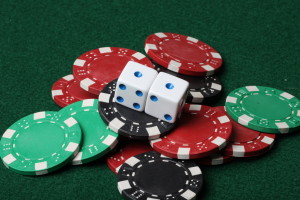
Do you think you have an addictive personality? No what about when it comes to games of chance are you fooled by the odds in your head?
New research published in Proceedings of the National Academy of Sciences, PNAS reports that an area of the brain thought to be important for emotion may be hyperactive in gambling addicts. People who suffer damage to this area – the insula – do not appear to experience the distorted thinking that spurs people to keep gambling.
Dr. Luke Clark, of the University of Cambridge, and colleagues set out to explore whether there might be a neurological explanation for the erroneous beliefs seen in problem gambling. Medical News Today reports that to do this Dr. Clark and colleagues needed to examine patients with brain injury, as he explains:
“While neuroimaging studies can tell us a great deal about the brain’s response to complex events, it’s only by studying patients with brain injury that we can see if a brain region is actually needed to perform a given task.“
The researchers recruited patients with injuries to one of three different parts of the brain – the insula, the amygdala or the ventromedial prefrontal cortex – and invited them to play two different gambling games: one using a slot machine and another using a roulette wheel.
The slot machine game was designed to deliver wins and near misses, such as a near jackpot where one of the cherries is just one place above or below the winning line. The roulette game just involved red or black predictions to bring out the gambler’s fallacy (i.e. assuming the chances of black are higher if there has been a run of reds).
For comparison, the researchers also invited patients with injuries to other parts of the brain and healthy volunteers to play the gambling games as well.
Many of us who play the lottery or the occasional game on a slot machine or roulette wheel have felt the hope that is reflected in thoughts like – “I didn’t win this time, so I am bound to win next time.” Problem gamblers seem to be more susceptible to this distorted thinking – what the researchers describe as “distorted psychological processing of random sequences (the gambler’s fallacy) and unrewarded outcomes that fall close to a jackpot (near misses).”
Many of experience the gambler’s fallacy when we toss a coin and get 10 heads in a row. There is a natural tendency to believe the odds of tossing a tails next time is higher. Yet while it feels hard to believe, the odds are exactly the same for the 11th toss, even after 10 heads in a row, as they were for the first – the chance of tossing tails is still 50-50.
The “near misses” distorted thinking is the kind that makes us believe that because we just missed the jackpot this time, it means we are more likely to hit it next time or in the future.
The results showed that only participants with intact insulas showed signs of cognitive distortion. They were more motivated to continue playing after near misses (compared with after full misses) on the slot machine, and they were also more likely to choose either color less after longer runs of that color on the roulette game.
This was not the case in those participants who had suffered damage to the insula, suggesting the damage had abolished the tendency to the type of distorted thinking that problem gamblers are more prone to.